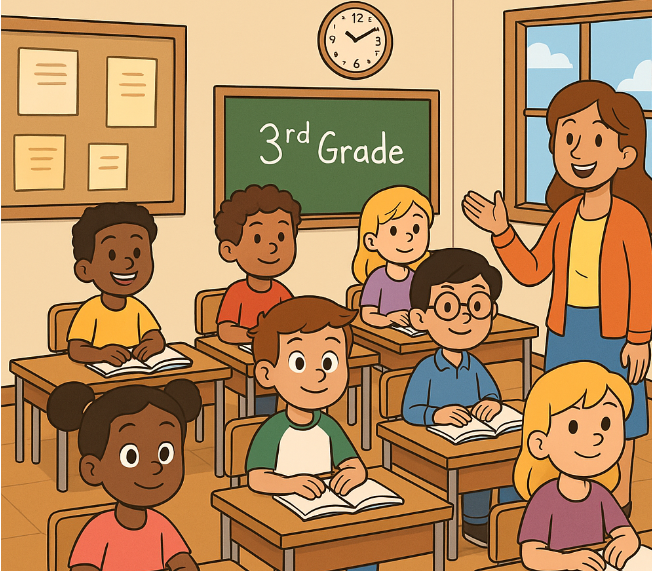
Why Early Language Support Transforms Kids’ Futures
Here’s a fact that might make you stop: two kids can enter kindergarten with the same spark in their eyes, the same love of stories, the same playful curiosity—yet by 5th grade, one is thriving while the other is falling behind. Why? Because of the invisible timing of a school label: English Learner.
A 13-year study following more than 1,100 students from kindergarten through 12th grade found that when schools reclassify English learners as “fluent” early—by 2nd or 3rd grade—those kids soar academically. But when reclassification drags into middle or high school, the costs are steep: lower test scores, lower GPAs, and fewer opportunities to access challenging coursework.
This isn’t just about test scores—it’s about the daily mental health and resilience of children who either feel capable and included or trapped by a system that underestimates them.
What the Study Revealed
The research tracked students in three California school districts for over a decade, focusing on when English learners were reclassified as fully proficient in English. Here’s what stood out:
- Half of kids were reclassified early (K–2 or grades 3–4). These “early-exit” students consistently performed as well as—or better than—their English-only peers in reading, math, and science.
- Late reclassification came at a cost. Students still labeled as English learners into middle or high school scored significantly lower across subjects and carried lower GPAs, even through 12th grade.
- Family background mattered. Kids whose parents had at least a high school diploma, who didn’t qualify for free lunch, or who were girls, were more likely to exit English learner status early.
The message? Timing matters. A lot.
Why This Hits Hard for Schools
Think about it from a child’s perspective. If you’re still labeled an “English learner” in 8th grade, you’re not just learning language—you’re often missing out on mainstream science, literature, and social studies classes. That means fewer chances to flex your curiosity, fewer opportunities to shine, and a steady drip of self-doubt.
For kids, that can feel like running a race where the starting gun goes off late. By the time they’re allowed onto the track, everyone else is already laps ahead.
The Mental Health Connection
Being stuck in the English learner category too long isn’t just an academic setback—it can fuel anxiety, lower self-esteem, and chip away at a student’s sense of belonging. Research already shows that kids who feel excluded from core classrooms are at higher risk for depression and disengagement.
Flip the script, and the story changes: early-reclassified kids often carry the confidence of knowing they can keep up, the joy of being included in challenging work, and the resilience that comes with success. In other words, early reclassification protects not just grades, but mental health.
Why Timing Is Tricky
Of course, schools face a tough balancing act. Reclassify too early, and children might still require additional language support. Reclassifying too late, and kids risk being held back unnecessarily.
The study reminds us that English acquisition isn’t one-size-fits-all. A child’s path is influenced by family resources, teacher expectations, and even gender norms in the classroom. Girls, for example, often outperform boys in early reclassification, which might reflect how classrooms reward certain behaviors like self-control and attentiveness
This raises big questions: Are our systems unintentionally setting some groups up to succeed while others fall behind? And how do we build school environments that recognize every child’s assets instead of focusing on deficits?
What Schools and Parents Can Do Today
So what’s the takeaway for parents, teachers, and school psychologists? Here are three practical steps:
- Push for timely support. Ask your child’s school how they decide when to reclassify students. Advocate for assessments that don’t just measure English but also protect access to grade-level content.
- Look at the whole child. Reclassification shouldn’t just be a language test. Schools should factor in classroom performance, teacher input, and a child’s social-emotional readiness.
- Keep supporting after reclassification. Just because a child is deemed “fluent” doesn’t mean they no longer need scaffolding. Continued support in reading comprehension and academic vocabulary can prevent hidden struggles later.
Why This Matters for Policy
At the policy level, this study is a wake-up call. We can’t afford reclassification systems that unintentionally harm the very kids they’re designed to help. Holding children in English learner programs for too long denies them access to advanced coursework—and limits their futures.
Instead, schools need equity-focused policies that expedite reclassification without prematurely cutting off supports. That means investing in bilingual programs, family engagement, and teacher training that sees bilingualism as a strength, not a barrier.
A Thought to Leave You With
Here’s the bottom line: the timing of a single label—English learner—can ripple through a child’s entire educational journey. Done right, early reclassification sets kids up to thrive academically and emotionally. Done wrong, it risks holding them back for years.
So, the question for all of us—parents, teachers, policymakers—is:
👉 What would it take to make sure every child, no matter their background, gets the chance to cross that finish line early, confident, and strong?
Let’s Talk About It
- What’s the biggest mental health challenge you see in schools today?
- How can schools better support students’ emotional well-being alongside academics?
- What’s one insight from school psychology or child development that changed the way you parent or teach?



